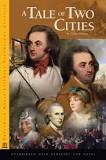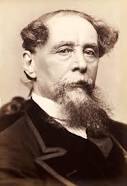A Tale of Two Cities Page #6
A Tale of Two Cities is a historical novel by Charles Dickens, set in London and Paris before and during the French Revolution.
“Pray take a seat, sir.” In a very clear and pleasant young voice; a little foreign in its accent, but a very little indeed. “I kiss your hand, miss,” said Mr. Lorry, with the manners of an earlier date, as he made his formal bow again, and took his seat. “I received a letter from the Bank, sir, yesterday, informing me that some intelligence--or discovery--” “The word is not material, miss; either word will do.” “--respecting the small property of my poor father, whom I never saw--so long dead--” Mr. Lorry moved in his chair, and cast a troubled look towards the hospital procession of negro cupids. As if they had any help for anybody in their absurd baskets! “--rendered it necessary that I should go to Paris, there to communicate with a gentleman of the Bank, so good as to be despatched to Paris for the purpose.” “Myself.” “As I was prepared to hear, sir.” She curtseyed to him (young ladies made curtseys in those days), with a pretty desire to convey to him that she felt how much older and wiser he was than she. He made her another bow. “I replied to the Bank, sir, that as it was considered necessary, by those who know, and who are so kind as to advise me, that I should go to France, and that as I am an orphan and have no friend who could go with me, I should esteem it highly if I might be permitted to place myself, during the journey, under that worthy gentleman's protection. The gentleman had left London, but I think a messenger was sent after him to beg the favour of his waiting for me here.” “I was happy,” said Mr. Lorry, “to be entrusted with the charge. I shall be more happy to execute it.” “Sir, I thank you indeed. I thank you very gratefully. It was told me by the Bank that the gentleman would explain to me the details of the business, and that I must prepare myself to find them of a surprising nature. I have done my best to prepare myself, and I naturally have a strong and eager interest to know what they are.” “Naturally,” said Mr. Lorry. “Yes--I--” After a pause, he added, again settling the crisp flaxen wig at the ears, “It is very difficult to begin.” He did not begin, but, in his indecision, met her glance. The young forehead lifted itself into that singular expression--but it was pretty and characteristic, besides being singular--and she raised her hand, as if with an involuntary action she caught at, or stayed some passing shadow. “Are you quite a stranger to me, sir?” “Am I not?” Mr. Lorry opened his hands, and extended them outwards with an argumentative smile. Between the eyebrows and just over the little feminine nose, the line of which was as delicate and fine as it was possible to be, the expression deepened itself as she took her seat thoughtfully in the chair by which she had hitherto remained standing. He watched her as she mused, and the moment she raised her eyes again, went on: “In your adopted country, I presume, I cannot do better than address you as a young English lady, Miss Manette?” “If you please, sir.” “Miss Manette, I am a man of business. I have a business charge to acquit myself of. In your reception of it, don't heed me any more than if I was a speaking machine--truly, I am not much else. I will, with your leave, relate to you, miss, the story of one of our customers.” “Story!” He seemed wilfully to mistake the word she had repeated, when he added, in a hurry, “Yes, customers; in the banking business we usually call our connection our customers. He was a French gentleman; a scientific gentleman; a man of great acquirements--a Doctor.” “Not of Beauvais?” “Why, yes, of Beauvais. Like Monsieur Manette, your father, the gentleman was of Beauvais. Like Monsieur Manette, your father, the gentleman was of repute in Paris. I had the honour of knowing him there. Our relations were business relations, but confidential. I was at that time in our French House, and had been--oh! twenty years.” “At that time--I may ask, at what time, sir?” “I speak, miss, of twenty years ago. He married--an English lady--and I was one of the trustees. His affairs, like the affairs of many other French gentlemen and French families, were entirely in Tellson's hands. In a similar way I am, or I have been, trustee of one kind or other for scores of our customers. These are mere business relations, miss; there is no friendship in them, no particular interest, nothing like sentiment. I have passed from one to another, in the course of my business life, just as I pass from one of our customers to another in the course of my business day; in short, I have no feelings; I am a mere machine. To go on--” “But this is my father's story, sir; and I begin to think”--the curiously roughened forehead was very intent upon him--“that when I was left an orphan through my mother's surviving my father only two years, it was you who brought me to England. I am almost sure it was you.” Mr. Lorry took the hesitating little hand that confidingly advanced to take his, and he put it with some ceremony to his lips. He then conducted the young lady straightway to her chair again, and, holding the chair-back with his left hand, and using his right by turns to rub his chin, pull his wig at the ears, or point what he said, stood looking down into her face while she sat looking up into his. “Miss Manette, it was I. And you will see how truly I spoke of myself just now, in saying I had no feelings, and that all the relations I hold with my fellow-creatures are mere business relations, when you reflect that I have never seen you since. No; you have been the ward of Tellson's House since, and I have been busy with the other business of Tellson's House since. Feelings! I have no time for them, no chance of them. I pass my whole life, miss, in turning an immense pecuniary Mangle.” After this odd description of his daily routine of employment, Mr. Lorry flattened his flaxen wig upon his head with both hands (which was most unnecessary, for nothing could be flatter than its shining surface was before), and resumed his former attitude. “So far, miss (as you have remarked), this is the story of your regretted father. Now comes the difference. If your father had not died when he did--Don't be frightened! How you start!” She did, indeed, start. And she caught his wrist with both her hands. “Pray,” said Mr. Lorry, in a soothing tone, bringing his left hand from the back of the chair to lay it on the supplicatory fingers that clasped him in so violent a tremble: “pray control your agitation--a matter of business. As I was saying--”
Translation
Translate and read this book in other languages:
Select another language:
- - Select -
- 简体中文 (Chinese - Simplified)
- 繁體中文 (Chinese - Traditional)
- Español (Spanish)
- Esperanto (Esperanto)
- 日本語 (Japanese)
- Português (Portuguese)
- Deutsch (German)
- العربية (Arabic)
- Français (French)
- Русский (Russian)
- ಕನ್ನಡ (Kannada)
- 한국어 (Korean)
- עברית (Hebrew)
- Gaeilge (Irish)
- Українська (Ukrainian)
- اردو (Urdu)
- Magyar (Hungarian)
- मानक हिन्दी (Hindi)
- Indonesia (Indonesian)
- Italiano (Italian)
- தமிழ் (Tamil)
- Türkçe (Turkish)
- తెలుగు (Telugu)
- ภาษาไทย (Thai)
- Tiếng Việt (Vietnamese)
- Čeština (Czech)
- Polski (Polish)
- Bahasa Indonesia (Indonesian)
- Românește (Romanian)
- Nederlands (Dutch)
- Ελληνικά (Greek)
- Latinum (Latin)
- Svenska (Swedish)
- Dansk (Danish)
- Suomi (Finnish)
- فارسی (Persian)
- ייִדיש (Yiddish)
- հայերեն (Armenian)
- Norsk (Norwegian)
- English (English)
Citation
Use the citation below to add this book to your bibliography:
Style:MLAChicagoAPA
"A Tale of Two Cities Books." Literature.com. STANDS4 LLC, 2024. Web. 24 Nov. 2024. <https://www.literature.com/book/a_tale_of_two_cities_19>.




Discuss this A Tale of Two Cities book with the community:
Report Comment
We're doing our best to make sure our content is useful, accurate and safe.
If by any chance you spot an inappropriate comment while navigating through our website please use this form to let us know, and we'll take care of it shortly.
Attachment
You need to be logged in to favorite.
Log In